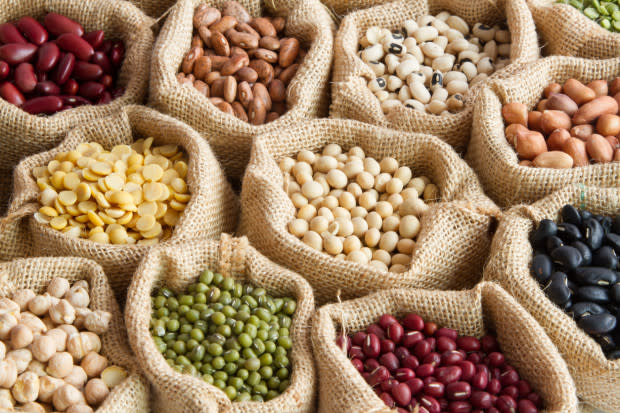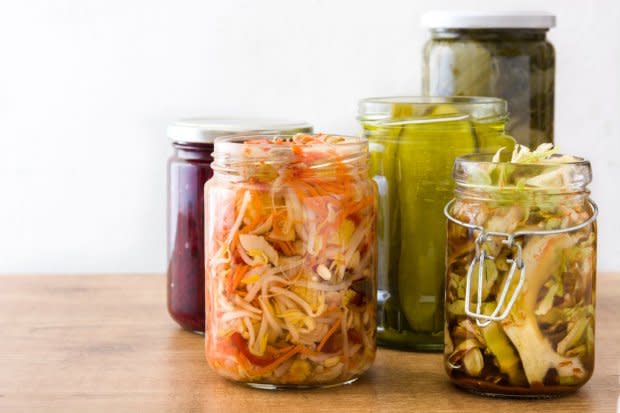Want To Live to 100? Here Are the 10 Most Important Foods To Add to Your Diet
If there was a pill you could take every day that increased your chances of living to be 100 in good health, would you take it? Of course, right? Fortunately, there’s something even better than a prescription drug out there that does exactly this: food.
There are some specific foods that scientific studies have linked again and again to longevity; not just living into old age, but living well into old age. While no food—or anything for that matter—is a guarantee you’ll live into the triple digits, eating a diet full of foods scientifically linked to longevity can certainly increase your chances. But which ones should you prioritize? There are many nutrient-rich foods out there, but these are the 10 longevity experts say are most important. Get ready to fill up that grocery cart!
10 Foods for Longevity
1. Vegetables
You knew vegetables would be on the list, right? “Scientific studies have shown that the risk for cancer goes up the less plant-based foods people have in their diets, specifically fruit and vegetables,” says Cary Kreutzer, EdD, MPH, RD, a professor at the University of Southern California Leonard Davis School of Gerontology.
All vegetables contain antioxidants, which help protect cells from free radicals, which play a role in disease and chronic illness. That means no matter what you end up buying from the produce section or farmers’ market, you’re eating with longevity in mind. But if you do want some specifics to go for, registered dietitian and Oregon State University College of Public Health and Human Sciences associate professor Stephanie Polizzi, MPH, RD, says to prioritize cruciferous vegetables (such as broccoli, cauliflower, and Brussels sprouts), which have a compound called sulforaphane, which protects against DNA damage and cancer.
Related: What Are the Healthiest Vegetables of All? Check Out This Top 20 List
2. Fruit
Like vegetables, fruit is also high in antioxidants. “When you eat fruit, keep the skin on because it contains pectin, which is a soluble fiber that’s good for the gut,” Polizzi says. In fact, fiber is another nutrient that’s majorly linked to longevity, and you’ll see it pop up not just in vegetables and fruit, but in other foods on this list too. In terms of specific fruits to add to your diet, blueberries have been shown to be an especially good one because they are high in polyphenols, a type of antioxidant linked to longevity.
3. Legumes
When it comes to protein sources, both experts say to prioritize plant-based proteins and they especially recommend legumes. “Legumes are full of protein, and fiber, and don’t contain saturated fat or cholesterol,” Polizzi says. She points out that they are a staple in regions of the world where people regularly live to be over 100 and in good health, such as Nicoya, Costa Rica; Sardinia, Italy; and Ikaria, Greece.

iStock
4. Whole grains
Kreutzer recommends a diet that includes whole grains such as oats, quinoa and brown rice because they’re full of fiber and help keep blood sugar levels steady. “This helps protect against type two diabetes,” she says. This is important because people with two diabetes have a decreased life expectancy up to eight years compared to people who don’t have diabetes.
Related: Learn More About What Whole Grains Are Best for Health
5. Chia seeds or flax seeds
Remember that link between fiber and longevity? It’s why Polizzi recommends incorporating flax seeds or chia seeds into your meals because they are especially great sources of soluble fiber, which helps aid digestion and may help reduce cholesterol.
6. Nuts
Both experts recommend incorporating nuts into your meals because they have several nutrients linked to longevity including fiber, plant-based protein, antioxidants and unsaturated fats—which are beneficial for heart health. “I like to sprinkle a mixture of nuts, seeds, and dried fruit into my salads,” Kreutzer says, as one easy way to incorporate them into meals.
7. Fermented foods
There’s a reason why gut health is a hot topic in the world of health and wellness; Kreutzer says that if you want to live a long, healthy life, then it’s imperative for your gut to be full of good bacteria. One way to do this is by eating fermented foods like kimchi, sauerkraut, miso and tempeh. “These foods provide our guts with good bacteria that is linked to helping our overall health,” Kreutzer says.

iStock
Related: 50 Probiotic-Rich Foods To Add To Your Diet
8. Sweet potato
Vegetables as a category may already be on the list, but this is one that’s worth calling out specifically because it's so beneficial. Polizzi explains that in Okinawa, Japan (a “Blue Zone” where many people regularly live to be over 100 in good health), sweet potatoes make up a full 60 percent of their total calories. Like many foods on this list, sweet potatoes are full of fiber and antioxidants, and they also have 400 percent of the vitamin A needed each day—an important nutrient that benefits the body’s immune system.
9. Avocado
The health hype surrounding avocados is real. Avocados are a good source of monounsaturated fatty acids, which help lower inflammation and support cardiovascular health. They’re also full of fiber and antioxidants.
10. Dark chocolate
Dark chocolate makes the longevity list for the same reason that blueberries do: it’s high in polyphenols, which are especially good for heart health. To really reap the benefits, go for chocolate that’s 70 percent of cacao or more.
While adding all these foods are linked to living a longer life, Polizzi says it’s important to remember that diet is just one piece of the longevity puzzle. Exercising regularly, getting good sleep, and stress management are all important too. But on the food front, it’s important to find ways to eat the foods on this list that you actually like, making good use of the endless cookbooks and online recipe sites. After all, you’ll likely be eating them for a long, long time.
Next up, see the eight healthiest cities in the U.S. Did yours make the list?
Sources
Cary Kreutzer, EdD, MPH, RD, registered dietitian and professor at the University of Southern California Leonard Davis School of Gerontology
Stephanie Polizzi, MPH, RD, registered dietitian and associate professor at Oregon State University College of Public Health and Human Sciences
